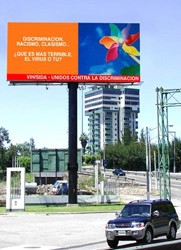
People living with HIV/AIDS often face stigma and discrimination, especially in Central America. In 2004, USAID, together with the President’s Emergency Plan for AIDS Relief, began building support for a mass media campaign for the region to reduce stigma and discrimination against people living with HIV/AIDS.
In Guatemala, the effort took off when La Fábrica Jotabequ, an advertising agency, accepted a pro bono project to design and produce a multi-faceted campaign to feature anti-discrimination messages on radio, television, cable television, billboards, and bus-stop signs. In May 2005, the campaign — “Uniting against Discrimination” — was launched. The response was overwhelmingly positive, especially from groups representing people living with HIV/AIDS. One of the secrets to the campaign’s success was that it was a true partnership: USAID was joined by Guatemala’s Ministry of Education, Ministry of Public Health, the National AIDS Program, and the Pan-American Health Organization in sponsoring the effort. In addition, many of the media outlets provided discounted advertising space.
Similar campaigns were launched with numerous government and non-government partners in El Salvador and Nicaragua, and plans are being made for a campaign in Panama. All the campaigns used a variety of venues — buses, restrooms, billboards, radio, and television — to deliver their message to the widest audience possible. The coordinated campaigns were very successful in meeting key goals. They enlisted the support of important government bureaus, non-government organizations, and private groups, enhancing both their reach and effectiveness. They were coordinated on a regional level to make sure that the same message transcended national and international boundaries. Finally, the campaigns were designed to be culturally sensitive — both to people living with HIV/AIDS and to the audiences whose behavior the campaign was changing, ensuring that the message was effectively heard. To evaluate the impact of this effort, USAID plans to review opinion surveys on perceptions about HIV/AIDS in the countries where the campaigns took place. In the meantime, there is optimism in the region that people are beginning to open their minds to the needs and vulnerabilities of people living with HIV/AIDS.







Comment
Make a general inquiry or suggest an improvement.